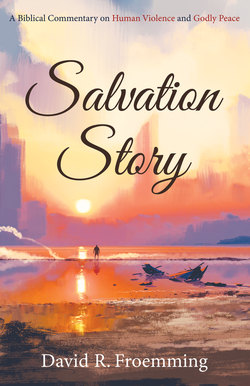Читать книгу Salvation Story - David R. Froemming - Страница 10
На сайте Литреса книга снята с продажи.
Exodus 1
Оглавление15 The king of Egypt said to the Hebrew midwives, one of whom was named Shiphrah and the other Puah, 16 “When you act as midwives to the Hebrew women, and see them on the birthstool, if it is a boy, kill him; but if it is a girl, she shall live.” 17 But the midwives feared God; they did not do as the king of Egypt commanded them, but they let the boys live. 18 So the king of Egypt summoned the midwives and said to them, “Why have you done this, and allowed the boys to live?” 19 The midwives said to Pharaoh, “Because the Hebrew women are not like the Egyptian women; for they are vigorous and give birth before the midwife comes to them.” 20 So God dealt well with the midwives; and the people multiplied and became very strong. 21 And because the midwives feared God, he gave them families. 22 Then Pharaoh commanded all his people, “Every boy that is born to the Hebrews you shall throw into the Nile, but you shall let every girl live.”
Walter Brueggemann observes that the genocide of Egypt by its ruler Pharaoh is rooted in the power of monopoly that at the same time lives in constant fear and anxiety that the many people whom they deprive through their hording will rise up and destroy them. And thus paradoxically their power starts to destroy the very source of their empire, namely the slaves!25 Here we observe what we saw in Isaiah, ultimately in the desire to possess things we become blind to how our own power turns back upon us.
The myth, the story the empire uses, is rooted in scarcity. Myth functions to conceal how human power is lying to justify its violence and death. Scarcity is a lie. Pharaoh and Egypt have plenty of grain for all to live. Yet, in their rivalry with other empires they cannot get enough grain and thus perpetuate the myth of scarcity. The biblical story, the salvation story, is exposing the lie contained in myth—the human suffering and death behind it.
Today it is not national powers alone that use the myth of scarcity to enslave people and justify genocide; it is global multinational corporate power as well. Today we find ourselves engaged in wars created by privatized multinational corporate power, our national budget drained by Pentagon business contractors, and the debt from the war is used to give the political message of scarcity, which in turn is used to justify the removal of social programs such as health and education. The end goal is global corporations taking over nations through the privatization of all services and replacing government with corporate control of the people and the earth’s resources.26 In the meantime we are kept distracted, indeed blinded, by the threat of terrorism, which uses national security as myth to perpetuate the ongoing violence, keeping the cycle of war debt and privatization going. Like Pharaoh killing his slaves, global corporations are destroying their own consumers, the environment beneath their feet and all around their mansions.
Paul Ricœur has noted that myth is never about morality, it is always about human death and human desire for immortality.27 Therefore the bible is not a morality book. The bible is an engagement with human myths that conceal violence and death, which in its evolution, sets out to expose human violence and injustice. Yet, this process is no quick matter. For myths also evolve and appear again in yet another form, always in an attempt to hide the violence that is rooted in our human rivalry—mimesis—our copying.
25. Brueggemann, Journey to the Common Good, 9–11.
26. Klein, The Shock Doctrine, 354–407.
27. Ricœur, The Symbolism of Evil, 187.
